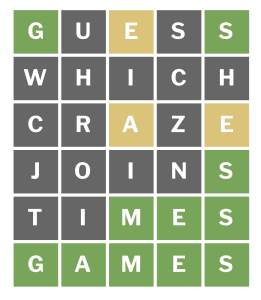It seems that just about everyone I know is playing “Wordle” every day. I asked my class of 33 honors students yesterday how many of them are playing Wordle—30 hands went up. If you are one of the few human beings who doesn’t know what Wordle is, it’s a game both simple and addictive. Each day you get six chances to guess a five-letter word. After each guess,
- A gray square means the letter is not in the word of the day
- A yellow square means the letter is in the word, but not in the right place.
- A green square means the letter is both in the word and in the right place.
Here’s a link to a more official explanation of the rules, including some visuals:
https://www.cnet.com/culture/internet/wordle-everything-you-need-to-know-about-the-viral-word-game/
The game has only been going on for three or four months—I’ve been playing daily for about two months—there’s a new game every 24 hours, posted at midnight EST. It takes no more than five minutes a day, but I’ve already learned a lot about myself from playing Wordle.
Some people take this more seriously than I do. For some of my Facebook friends and personal acquaintances, their daily identity is wrapped up not only in whether they got the word, but in how few guesses it took to get it. Wordle makes it incredibly easy to share your results on your favorite social media platform (I do it every day on Facebook, unless I don’t get the word); God help you if you provide any hints or say anything seemingly innocent such as “today’s was more difficult than usual” (that one got me several “please don’t put any spoilers in your Wordle results posts”).
Some people are not satisfied with simply getting the word of the day. They consider themselves to be a 24-hour failure if they don’t get it in three or fewer attempts. I usually get it in four or five, but six is fine as well. I’m glad that my only goal is to get the word, regardless of how many tries, because the second time I ever played the game, I had the incredible luck of guessing the word on the first try. I would hate to have established that as my benchmark of success going forward.
Strategy. Everyone has a different strategy for Wordle; there are unlimited sites providing suggestions for such strategies. One of my colleagues uses the same word to start every day. Should it contain as many vowels as possible? The most used consonants? Should your second word be a refinement of your first word, or a word using five different letters than the first guess? There is a virtual typewriter keyboard at the bottom of the Wordle screen to help you keep track of which letters you have used.
I have no strategy. Really. I start with whatever five letter word first pops into my head and go from there. My no-strategy strategy is probably why I am no good at chess, Monopoly, or any game whatsoever that requires a strategy. But Wordle keeps track of your past performance; I have played about sixty times so far with a success record of over 90% and a current success string of seven puzzles. That’s good enough for me.
This tells me that I’m not particularly competitive when it comes to games, although I am very competitive in other areas of my life, such as when I am seeking to beat my previous record for time and calories used on a frequently ridden bike trail. Go figure.
My best Wordle success comes in the middle of the night. I suffer from mild insomnia at times. I never have trouble falling asleep, but I have trouble staying asleep. My Garmin tells me that I typically spend at least half the night in light sleep and never have any REM sleep. This is not good.
Except that the new Wordle puzzle for the day comes up at midnight. I have often played Wordle between midnight and 1 in the morning; I have never failed to guess the word under those circumstances, and I frequently get it in fewer guesses than when I do it in the middle of waking hours. I have no idea what this means or what this says about me, but there you have it.
Wordle is easier than Worldle. There have, of course, been any number of spinoffs of Wordle. The only one that I play is the geography guessing game called “Worldle.” Each day you are provided with the shape of a country, and you get six guesses to establish what the country is. I’ve always thought of myself as pretty good at geography—this game has clearly established that I am not.
For me, this has turned out to be pretty much an “all or nothing” game. Either I guess it on the first try, or I don’t get it at all. First time successful guesses have included Australia, Cuba, Sweden, and Brazil. Unsuccessful Worldle days have included one of the “-stan” countries, any number of African countries, and the amazing abundance of island chain nations in the Pacific that I’ve never heard of. Worldle provides a directional and percentage clue after each incorrect guess that helps locate roughly the area of the globe where one will find the country of the day. When these clues point me toward the Pacific Ocean or Africa, I know I’m going to lose.
I really am partially colorblind. I’ve known this since I was a small child, but it seldom has been that important. Jeanne is always willing to make color choices for me when I’m in an area of the color palette that I know I see differently than other “normal” people do.
But my partial color blindness is a regular problem when playing Wordle. As noted above, a yellow square means that the letter in the square is in the day’s word but in the wrong place. A green square means that the letter is in the word and in the correct place. Unfortunately, the gold and green often look the same to me on my Surface 4. Under certain lighting conditions, I really can’t tell the difference—which of course is a big problem for playing the game.
I discovered, though, that I can tell the colors more accurately on my Android. I much prefer not to do anything other than call or text on my phone because my fingers are too big to “type” accurately, but I’ve gotten into the habit of opening Wordle up on my phone when I can’t tell the colors properly on my Surface 4. Then my ever-helpful youngest son pointed out that it is possible to set the colors on Wordle differently in order to assist the color-challenged. Game changer. Problem solved—except that this has opened another more serious problem that I was never fully aware of.
I am not above cheating. Imagine the scenario. I’m trying to play Wordle on my Surface 4 and I can’t tell the difference between yellow and green. So I open up my Android and start playing there. Now I have two devices open playing Wordle at the same time. Wordle is not smart enough to know that the guy playing their game on the Surface 4 and the guy playing it on the phone are the same guy.
In the early hours of one morning a month or so ago I had both devices open, choosing to move from computer to phone because of the colorblindness problem. The word was a tough one—I had guessed four times and had only found three letters, two of them in the incorrect place. Then it occurred to me . . . I could put guess #4 from my phone into the game on my computer as guess #2 and get a couple of extra guesses. As it turned out, I needed them—I got the word on guess #5 on my computer.
I wish I could say that it was a one-off moment of weakness, but I’m a repeat offender. I’ve done this two or three times. That’s right—I’m an insomniac, colorblind Wordle cheater. But before you call the Wordle police in order to get me banned from the game for life, be sure that there isn’t a beam in your own eye. At least I haven’t shared my winning results on Facebook from one of the times I cut a few corners. At least I don’t think I have—actually, I might have. I’m teaching a section of General Ethics next semester. Something tells me that I’d better include a chapter on the ethics of Wordle.













